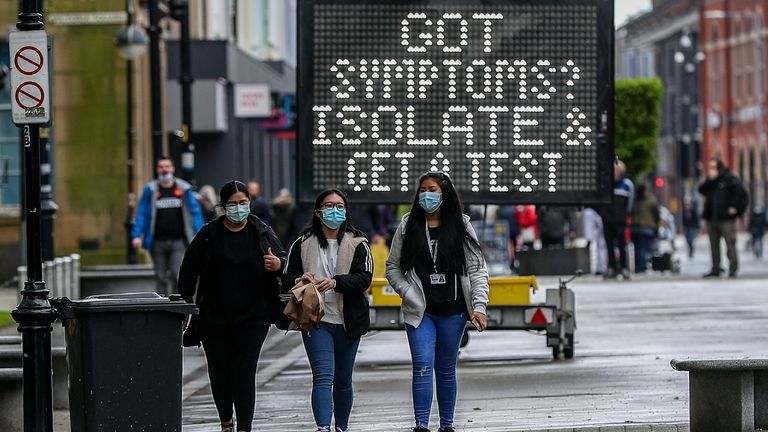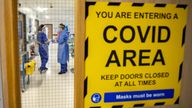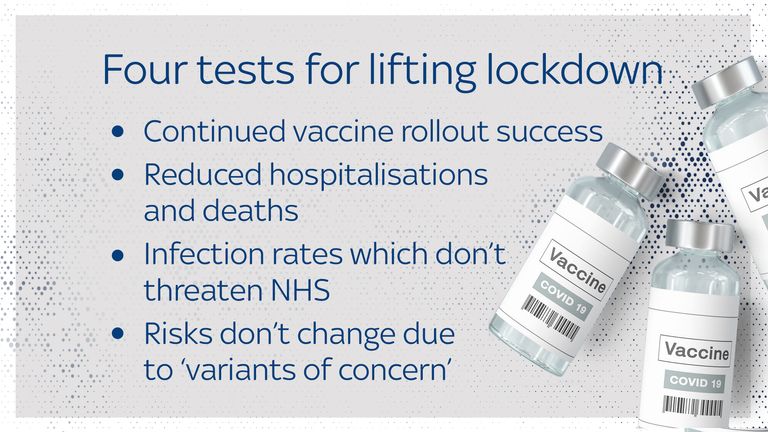COVID-19: UK reports 8,125 new cases - highest daily number since late February
The British Medical Association is calling for the easing of lockdown to be delayed following another increase in COVID cases.
Friday 11 June 2021 22:16, UK
The UK has reported 8,125 new COVID-19 cases in the last 24 hours - the highest daily figure since 26 February, when 8,523 were recorded.
The latest government data compares to 7,393 cases on Thursday and 6,238 for last Friday.
The latest daily figures also show there were 17 deaths recorded within 28 days of a positive test.
Meanwhile, 201,607 more people have received their first dose of a vaccine and 308,038 received their second jab.
There are now 41,088,485 who have received one jab and 29,165,140 have received both.
The increase in cases has led the British Medical Association (BMA) to call for a delay to the planned easing of all lockdown restrictions on 21 June.
Sky News deputy political editor Sam Coates understands more doctors are set to come out against the 21 June date tomorrow.
The BMA says the current data and evidence shows that ending restrictions in just over a week would not meet the government's own four tests and the situation should instead be reviewed on a fortnightly basis.
The chair of the BMA Council, Dr Chaand Nagpaul said: "With only 54.2% of the adult population currently fully vaccinated and many younger people not yet eligible, there is a huge risk that prematurely relaxing all restrictions will undo the excellent work of the vaccine programme and lead to a surge of infections.
"It's not just about the number of hospitalisations, but also the risk to the health of large numbers of younger people, who can suffer long-term symptoms affecting their lives and ability to work.
"Importantly, the current data and evidence shows that ending restrictions in just over a week would not meet the government's own four tests, and it is vital that the prime minister honours his own commitment to the population on how to safeguard the health of the nation."
It comes after reports the government is considering a four-week delay to the plan to ease lockdown, to give businesses certainty and allow more time for people to receive both vaccine doses.
Deputy political editor Sam Coates says there is "growing pessimism" in government that the 21 June unlocking will go ahead, with ministers considering either a two or four-week delay.
"It could be as late as 19 July before those final restrictions are removed," he said.
He added that there is "no bit of government fighting against an extension", with the treasury in particular willing to delay if necessary.
Subscribe to the Sky News Daily podcast on Apple Podcasts, Google Podcasts, Spotify, Spreaker
However, Sadiq Khan has told Boris Johnson England's capital is ready to open on 21 June.
According to LBC, the mayor of London wrote a letter to the prime minister saying he believed the "four tests" had been met in the city and "any delay" to the reopening "will have severe consequences for businesses, who have suffered so much already".
The letter continues to say London's hospitality, nightlife and cultural sectors will "remain unable to reopen or fully reopen in an economically viable way" as long as social distancing is in place and "are at risk of catastrophic collapse".
Mr Khan also urges ministers to extend the 100% business rates holiday and the business evictions moratorium if restrictions are extended beyond 21 June.
The latest figures come after Public Health England (PHE) revealed that more than 90% of new COVID-19 cases in the UK are now the Delta (Indian) variant.
PHE said it is 64% more transmissible than the Alpha (Kent) variant and vaccines are less effective against it.
Downing Street has defended its borders policy in relation to the variant, amid continued criticism of the prime minister over the time it took to place India on the red list.
His spokesman said: "I would point to the tough border measures that we've had in place for a fair amount of time now, that we've ensured that anybody arriving from India needed to quarantine at home, and then later as you said they were put on the red list which means that people have to quarantine in a hotel if they arrive in the UK from India."




